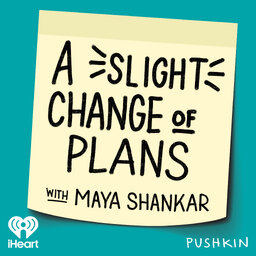The Science of Connection
Dr. Dixon Chibanda, a psychiatrist in Zimbabwe, has been on a mission for years to help people gain access to mental healthcare in his community, where there's only one psychiatrist for every 1.5 million people. To bridge the gap and provide people with the help they need, Dixon turned to a rather unorthodox group for help: grandmothers.
You can follow the show at @DrMayaShankar on Instagram. If you’d like to keep up with the most recent news from this and other Pushkin podcasts be sure to sign up for our email list at Pushkin.fm.
Learn more about your ad-choices at https://www.iheartpodcastnetwork.com
In 1 playlist(s)
A Slight Change of Plans
What happens when life doesn’t go according to plan? In this award-winning podcast, cognitive scient…Social links
Follow podcast
Recent clips

Michael Lewis and Maya Talk “The Other Side of Change”
1:00:17

How To Be Happier This Year
37:47

A Sneak Preview Of Maya’s New Book
41:49
 A Slight Change of Plans
A Slight Change of Plans